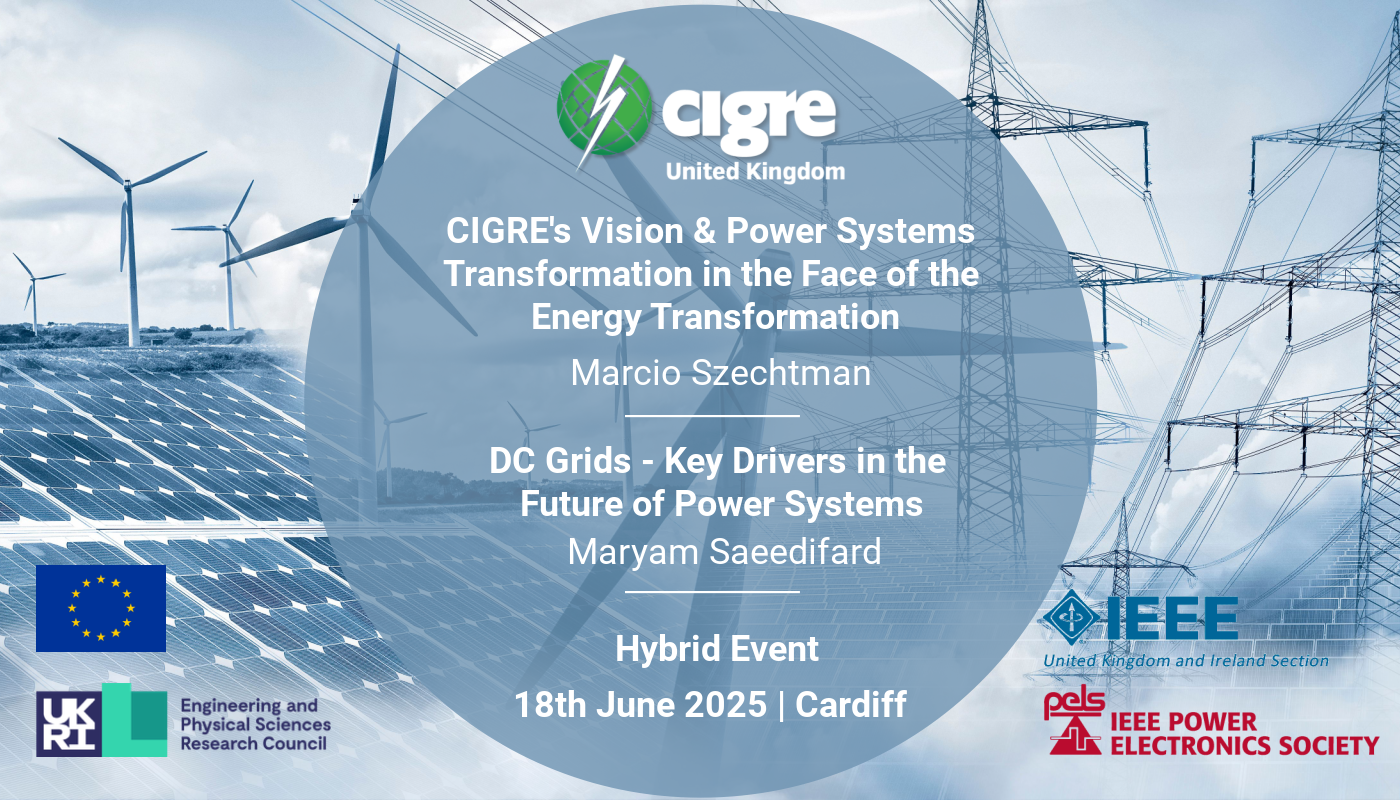
This seminar consists of two lectures and is being kindly hosted at Cardiff University, then simultaneously online for those that cannot attend in-person. Professor Jun Liang, UK C6 Regular Member, will introduce 2 distinguish lecturers, Prof. Marcio Szechtman and Prof. Maryam Saeedifard who are visiting the UK from Brazil and the USA.
The first lecture, presented by Prof. Marcio Szechtman, is a training event jointly organised by CIGRE and the EC Horizon Europe Marie Skłodowska-Curie ITN project. The lecture will provide a strategic overview of CIGRE’s contributions to global power system transformation amidst the accelerating energy transition. It will introduce the CIGRE Next Generation Network, offering valuable insights into how emerging professionals can engage in the international energy community. Closely aligned with the mission of CIGRE Study Committee C6, the lecture supports the advancement of engineering and international knowledge exchange in the areas of active distribution systems and distributed energy resources. With a focus on the distribution sector and the integration of new technologies, this lecture is especially relevant for PhD students and early-career researchers aiming to align their work with global energy priorities. Attendees will gain a deeper understanding of current trends, future directions, and the collaborative spirit of CIGRE’s global initiatives.
Then the second lecture, presented by Prof. Maryam Saeedifard, is a training event jointly organised by CIGRE and the EC Horizon Europe Marie Skłodowska-Curie ITN project. The lecture will explore the transformative role of high voltage and multi-terminal DC grids in the evolving landscape of global energy systems. The lecture aligns with the objectives of CIGRE Study Committee C6, which aims to advance engineering practices and promote international knowledge exchange in the areas of active distribution systems and distributed energy resources. With a focus on the operational, control, and protection challenges of MVDC/HVDC technologies, this session offers a unique opportunity for PhD students and early-career researchers to gain cutting-edge insights into the core technologies driving the future power networks. Attendees will gain valuable insights from real-world international transmission projects and discover how innovations in DC transmission are driving the development of cleaner, more reliable, and more adaptable power systems.
The Agenda for the day, outlined below, is in two parts with a simultaneous online Webex session (please choose either or both when registering to attend online). The Webex login details will be sent in the confirmation email once registered.
If you are attending in-person, there will be a 30 minute refreshment/networking break between lectures culminating in a buffet lunch. There is no fee for attendance.
In-Person Meeting Details
📅 Date: Wednesday 18th June 2025
🕒 Time: 09:00 – 13:30
📍 Location: Lecture Theatre 2.09, Trevithick Building, Cardiff University, The Parade, Newport Road, Cardiff, CF24 3AA
Please register for in-person or online attendance
AGENDA
09:00 – 10:30
CIGRE’s visions and Power System Transformation in face of the Energy Transition – Marcio Szechtman
Abstract: This presentation will provide an overview of CIGRE’s structure and its role in advancing the power sector amidst the ongoing energy transition. It will introduce the Next Generation Network (NGN) initiative. The talk will explore how CIGRE is contributing to the transformation of power systems, with particular attention to the distribution segment and how to capture relevant Energy Transition aspects in this Segment. Through this lens, the presentation aims to showcase CIGRE’s forward-looking vision in shaping resilient, sustainable, and innovative power systems.
10:30 – 11:00
Networking Break
11:00 – 12:30
DC Grids: Key Drivers in the Future of Power Systems – Maryam Saeedifard
Ken Byers Professor, School of Electrical and Computer Engineering, Georgia Institute of Technology
Abstract: High Voltage DC (HVDC) transmission is a long-standing technology with many installations around the world. Over the past few years, significant breakthroughs in the voltage-sourced converter technology along with their attractive features have made the HVDC technology even more promising in providing enhanced reliability and functionality and reducing cost and power losses. Concomitantly, significant changes in generation, transmission, and loads such as (i) integration and tapping renewable energy generation in remote areas, (ii) need for relocation or bypassing older conventional and/or nuclear power plants, (iii) increasing transmission capacity, and (iv) urbanization and the need to feed the large cities have emerged. These new trends have called for Multi-Terminal DC (MTDC) systems, which when embedded inside the AC grid, can enhance stability, reliability, and efficiency of the present power grid. The strategic importance of MVDC and HVDC grids is evidenced by the number of worldwide projects currently in their advanced planning stage, e.g., European “Supergrids” and the Baltic Sea project along with several projects in the US and China. This presentation is focused on opportunities brought by the MTDC grids and addressing the technical challenges associated with their operation, control and protection in future power systems.
12:30 – 13:30
Networking Lunch
PRESENTER BIOGRAPHIES
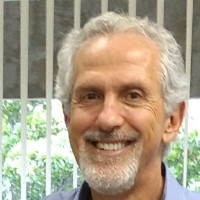
Marcio Szechtman was the the Eletrobras Chief Transmission Officer 2019 – 2023 and the CIGRE Technical Council Chair 2018 – 2024. He has been involved in HVDC technology since the 1970’s till now. He was the Director General of CEPEL – Brazilian Center for Electric Energy Research between 2017 and 2019. Between 1997 and 2016, he worked as a consultant in Brazil, India, Colombia, Ireland, Canada, Pakistan, Chile and Peru, in the areas of AC/DC power transmission and electrical transmission regulation. He was deeply involved in many HVDC projects in Brazil and in India. From 1975 to 1996 he worked as Researcher at CEPEL. He received the IEEE Uno Lamm Medal in 2009 for his contributions to the HVDC transmission area, and in 2014 received the CIGRE Medal for his contributions to electrical engineering. Between 2002 to 2008 he Chaired the CIGRE Study Committee B4 – HVDC and Power Electronics
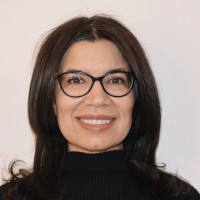
Maryam Saeedifard received the Ph.D. degree in electrical engineering from the University of Toronto, in 2008. Since January 2014, she has been with the School of Electrical and Computer Engineering at Georgia Institute of Technology, where she is currently a Ken Byers professor. She is a recipient of the IEEE Modeling and Control Technical Achievement Award in 2024, the IEEE Bimal Bose Award for Industrial Electronics Applications in Energy Systems in 2024, Roger Webb’s Excellence in Mentorship Award from the School of Electrical and Computer Engineering at Georgia Tech in 2023, the 8th Nagamori Awards from Nagamori Foundation in 2022, Roger Webb’s Outstanding Mid-Career Faculty Award from the School of Electrical and Computer Engineering at Georgia Tech in 2021, U.S. Clean Energy Education and Empowerment (C3E) Technology Research & Innovation Award from the Department of Energy in 2021, First Place Prize Paper Award from the IEEE Transactions on Power Electronics in 2023, 2022 and 2021, Best Transactions Paper Award of the IEEE Transactions on Industrial Electronics in 2018 and 2016, IEEE J. David Irwin Early Career Award in 2018, U.S. National Academy of Engineering, Frontiers in Engineering in Education in 2012, U.S. National Academy of Engineering, Frontiers in Engineering in 2011, and IEEE Richard M. Bass Outstanding Young Power Electronic Engineer Award in 2010. She is an IEEE Fellow and is currently serving as the Editor-in-Chief of IEEE Trans. on Power Electronics Letters. Her research interests include power electronics and its applications in terrestrial and mobile power systems.
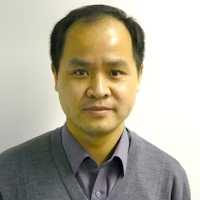
Jun Liang is Chair Professor at Cardiff University. He has over 30 years’ experience in renewable energy, DC transmission/distribution, power electronic converter control, power system operation and electrified transport. He currently leads a research group in power electronics and DC technologies for renewable power generation and transmission. He has led and obtained research funding over £20M, including £9M external funding under his portfolio in 32 projects. He is the Coordinator and Scientist-in-Charge of three European Commission Marie-Skłodowska-Curie ITN/ETN/DN projects (total €13M, 2013-2026). He has published over 260 papers including 160 journal papers, 1 book in IEEE/Wiley, and 4 book chapters. He has supervised 32 PhD students with 21 of them graduated so far, and 10 post-doctoral researchers. Jun Liang (IEEE Fellow’24) received the B.Sc. degree from Huazhong University of Science and Technology, Wuhan, China, in 1992 and the M.Sc. and Ph.D. degrees from China Electric Power Research Institute, Beijing, China, in 1995 and 1998, respectively. He is an IEEE Fellow and IET Fellow, the Chair of UK&RI Chapter of IEEE Power Electronics Society, Vice Chair of IEEE PELS Region 8 committee promoting IEEE membership, the CIGRE C6 UK Regular Member, an Organising Committee member of the IET ACDC conferences, a committee member of CIGRE Working Groups C6/B4-37, B4-58, 60, 62 and 72, the Technical Secretary of the CIGRE WG B4-60, C6/B4-37, Committee member of the British Standards Institution (BSI), the Committee member of International Electrotechnical Commission (IEC) SC 8A, an Associate Editor of IEEE Transaction on Sustainable Energy, an Editor of CSEE JPES, a Guest Editor of IEEE Transaction on Power Delivery, and technical committee members of several international Conferences.
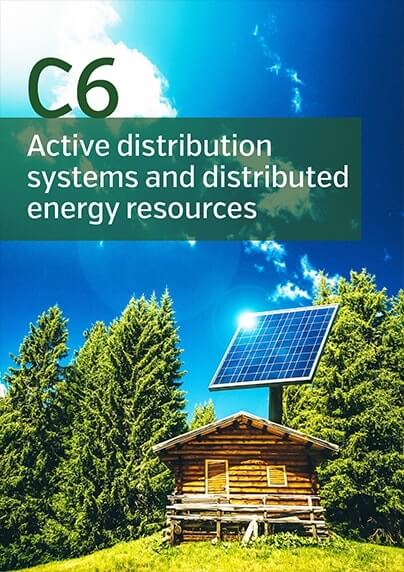
Mission
Assessment of the technical impacts resulting from a more widespread adoption of DER applications on planning and operation and on approaches, and of enabling technologies and innovative solutions for DER integration in active distribution systems.
Within this framework additional specific areas of attention include:
- Enabling technologies for renewable and distributed energy resource integration and application: active network management, microgrids, virtual power plants, distribution management systems (DMS, ADMS, DERMS), DER monitoring and control, aggregation systems and platforms, block-chain applications.
- Innovative solutions for DER and distribution technology deployment: smart inverters and power electronic interfaces, interconnection and integration requirements, MV/LV DC supply systems, distribution system modernization.
- Storage technologies: deployment of various storage technologies such as electrochemical electric battery energy storage systems, flywheels, flow batteries, and new storage
- Multi-energy solutions (including thermal storage), Power2X applications (including power to heat, power to gas), electric vehicles.
- New approaches to configure new distribution systems for enhanced reliability and resilience: islandable grid connected microgrids, power exchange between microgrids.
- New approaches to determine the impact and plan and operate distribution systems in the context of a wide deployment of DER, including the analysis of hosting capacity and protection
- Consumer integration and empowerment: demand side integration and participation, demand response, load management, smart load, new customer sectors such as electric vehicles, smart home and smart meter applications with impact on distribution systems.
- Smart cities: integrated distribution system technologies, power, control, and information and communication technology deployment for flexibility, integration of multi-energy systems.
- Rural Electrification: islanded power systems and individual customer off-grid systems, new solutions, weak grid connected systems.
